CCNA Discovery 3 Chapter 8 V4.0 Answers
1. Which wildcard mask would match the host range for the subnet 192.16.5.32 /27?
0.0.0.32
0.0.0.63
0.0.63.255
0.0.0.31
2.
Refer to the exhibit. The new security policy for the company allows all IP traffic from the Engineering LAN to the Internet while only web traffic from the Marketing LAN is allowed to the Internet. Which ACL can be applied in the outbound direction of Serial 0/1 on the Marketing router to implement the new security policy?
access-list 197 permit ip 192.0.2.0 0.0.0.255 any
access-list 197 permit ip 198.18.112.0 0.0.0.255 any eq www
access-list 165 permit ip 192.0.2.0 0.0.0.255 any
access-list 165 permit tcp 198.18.112.0 0.0.0.255 any eq www
access-list 165 permit ip any any
access-list 137 permit ip 192.0.2.0 0.0.0.255 any
access-list 137 permit tcp 198.18.112.0 0.0.0.255 any eq www
access-list 89 permit 192.0.2.0 0.0.0.255 any
access-list 89 permit tcp 198.18.112.0 0.0.0.255 any eq www
3.
Refer to the exhibit. Hosts from 172.19.123.0 are not allowed access to 192.0.2.0 but should be able to access the Internet. Which set of commands will create a standard ACL that will apply to traffic outbound on the Shannon router interface Fa0/0 implementing this security?
access-list 142 deny ip 172.19.123.0 0.0.0.255 192.0.2.0 0.0.0.255
access-list 142 permit ip any any
access-list 56 deny 172.19.123.0 0.0.0.255
access-list 56 permit any
access-list 61 deny 172.19.123.0 0.0.0.0
access-list 61 permit any
access-list 87 deny 192.0.2.0 0.0.0.255
access-list 87 permit any
4.
Refer to the exhibit. An administrator notes a significant increase in the amount of traffic that is entering the network from the ISP. The administrator clears the counters. After a few minutes, the administrator again checks the access-list table. What can be concluded from the output that is shown?
A small amount of HTTP traffic is an indication that the web server was not configured correctly.
A larger amount of POP3 traffic, compared with SMTP traffic, indicates that there are more POP3 e-mail clients than SMTP clients in the enterprise.
A large amount of ICMP traffic is being denied at the interface, which can be an indication of a DoS attack.
A larger amount of e-mail traffic, compared with web traffic, is an indication that attackers mainly targeted the e-mail server.
5.
Refer to the exhibit. A network administrator needs to add the command deny ip 10.0.0.0 0.255.255.255 any log to R3. After adding the command, the administrator verifies the change using the show access-list command. What sequence number does the new entry have?
0
10, and all other items are shifted down to the next sequence number
50
60
6. A security administrator wants to secure password exchanges on the vty lines on all routers in the enterprise. What option should be implemented to ensure that passwords are not sent in clear text across the public network?
Use Telnet with an authentication server to ensure effective authentication.
Apply an access list on the router interfaces to allow only authorized computers.
Apply an access list on the vty line to allow only authorized computers.
Use only Secure Shell (SSH) on the vty lines.
7. What is the best option an administrator can choose to ensure that ICMP DoS attacks from the outside are contained as much as possible, without restricting connectivity tests initiated from the inside out?
Create an access list that permits only echo reply and destination unreachable packets from the outside.
Create an access list that denies all TCP traffic coming from the outside.
Permit TCP traffic from only known external sources.
Create an access list with the established keyword at the end of the line.
8. Traffic from the 64.104.48.0 to 64.104.63.255 range must be denied access to the network. What wildcard mask would the network administrator configure in the access list to cover this range?
0.0.15.255
0.0.47.255
0.0.63.255
255.255.240.0
9. A network administrator enters the following commands on router RTB.
RTB(config)# access-list 4 deny 192.168.20.16 0.0.0.15
RTB(config)# access-list 4 permit any
RTB(config)# interface serial 0/0/0
RTB(config-if)# ip access-group 4 in
Which addresses are blocked from entering RTB?
192.168.20.17 to 192.168.20.31
192.168.20.16 to 192.168.20.31
192.168.20.16 to 192.168.20.32
192.168.20.17 to 192.168.20.32
10. Why are inbound ACLs more efficient for the router than outbound ACLs?
Inbound ACLs deny packets before routing lookups are required.
Inbound ACL operation requires less network bandwidth than outbound.
Inbound ACLs permit or deny packets to LANs, which are typically more efficient than WANs.
Inbound ACLs are applied to Ethernet interfaces, while outbound ACLs are applied to slower serial interfaces.
11.
Refer to the exhibit. The network administrator of a company needs to configure the router RTA to allow its business partner (Partner A) to access the web server located in the internal network. The web server is assigned a private IP address, and a static NAT is configured on the router for its public IP address. Finally, the administrator adds the ACL. However, Partner A is denied access to the web server. What is the cause of the problem?
Port 80 should be specified in the ACL.
The public IP address of the server, 209.165.201.5, should be specified as the destination.
The ACL should be applied on the s0/0 outbound interface.
The source address should be specified as 198.133.219.0 255.255.255.0 in the ACL.
12. ACL logging generates what type of syslog message?
unstable network
warning
informational
critical situation
13.
Refer to the exhibit. Company policy for the network that is shown indicates the following guidelines:
1) All hosts on the 192.168.3.0/24 network, except host 192.168.3.77, should be able to reach the 192.168.2.0/24 network.
2) All hosts on the 192.168.3.0/24 network should be able to reach the 192.168.1.0/24 network.
3) All other traffic originating from the 192.168.3.0 network should be denied.
Which set of ACL statements meets the stated requirements when they are applied to the Fa0/0 interface of router R2 in the inbound direction?
access-list 101 deny ip any any
access-list 101 deny ip 192.168.3.77 0.0.0.0 192.168.2.0 0.0.0.255
access-list 101 permit ip 192.168.3.0 0.0.0.255 192.168.2.0 0.0.0.255
access-list 101 permit ip 192.168.3.0 0.0.0.255 192.168.1.0 0.0.0.255
access-list 101 permit ip 192.168.3.0 0.0.0.255 192.168.2.0 0.0.0.255
access-list 101 deny ip 192.168.3.77 0.0.0.0 192.168.2.0 0.0.0.255
access-list 101 permit ip 192.168.3.0 0.0.0.255 192.168.1.0 0.0.0.255
access-list 101 deny ip 192.168.3.77 0.0.0.0 192.168.2.0 0.0.0.255
access-list 101 permit ip 192.168.3.0 0.0.0.255 192.168.2.0 0.0.0.255
access-list 101 permit ip 192.168.3.0 0.0.0.255 192.168.1.0 0.0.0.255
access-list 101 permit ip 192.168.3.0 0.0.0.255 192.168.2.0 0.0.0.255
access-list 101 deny ip 192.168.3.77 0.0.0.0 192.168.2.0 0.0.0.255
access-list 101 permit ip 192.168.3.0 0.0.0.255 192.168.1.0 0.0.0.255
access-list 101 permit ip any any
access-list 101 deny ip 192.168.3.77 0.0.0.0 192.168.2.0 0.0.0.255
access-list 101 permit ip 192.168.3.0 0.0.0.255 192.168.0.0 0.0.255.255
14. Which ACL statement permits host 10.220.158.10 access to the web server 192.168.3.224?
access-list 101 permit tcp host 10.220.158.10 eq 80 host 192.168.3.224
access-list 101 permit tcp 10.220.158.10 0.0.0.0 host 192.168.3.224 0.0.0.0 eq 80
access-list 101 permit host 10.220.158.10 0.0.0.0 host 192.168.3.224 0.0.0.0 eq 80
access-list 101 permit tcp 10.220.158.10 0.0.0.0 host 192.168.3.224 eq 80
15. Which two statements are true about standard and extended ACLs? (Choose two.)
Extended ACLs filter only on source addresses and must be placed near the destination address.
Standard ACLs are usually placed so that all packets go through the network and are filtered at the destination.
Standard ACLs are used when filtering complex requirements, such as specific protocols.
Extended ACLs filter with many possible factors, and are placed near the source address to reduce traffic across the network.
Properly designed ACLs have a negative impact on network availability and performance.
16.
Refer to the exhibit. What happens if the network administrator issues the exhibited commands when an ACL named Managers already exists on the router?
The new commands overwrite the current Managers ACL.
The new commands are added to the end of the current Managers ACL.
The new commands are added to the beginning of the current Managers ACL.
An error appears stating that the ACL already exists.
17. What effect does the command reload in 30 have when entered into a router?
If a router process freezes, the router reloads automatically.
If a packet from a denied source attempts to enter an interface where an ACL is applied, the router reloads in 30 minutes.
If a remote connection lasts for longer than 30 minutes, the router forces the remote user off.
A router automatically reloads in 30 minutes.
18.
Refer to the exhibit. Which two host addresses from the 172.16.31.64/27 subnet are able to telnet into the router to make configuration changes? (Choose two.)
172.16.31.33
172.16.31.64
172.16.31.77
172.16.31.92
172.16.31.95
172.16.31.96
19. ACLs are used primarily to filter traffic. What are two additional uses of ACLs? (Choose two.)
specifying source addresses for authentication
specifying internal hosts for NAT
identifying traffic for QoS
reorganizing traffic into VLANs
filtering VTP packets
20.
Refer to the exhibit. A network administrator needs to configure an access list that will allow the management host with an IP address of 192.168.10.25/24 to be the only host to remotely access and configure router RTA. All vty and enable passwords are configured on the router. Which group of commands will accomplish this task?
Router(config)# access-list 101 permit tcp any 192.168.10.25 0.0.0.0 eq telnet
Router(config)# access-list 101 deny ip any any
Router(config)# int s0/0
Router(config-if)# ip access-group 101 in
Router(config-if)# int fa0/0
Router(config-if)#ip access-group 101 in
Router(config)# access-list 10 permit 192.168.10.25 eq telnet
Router(config)# access-list 10 deny any
Router(config)# line vty 0 4
Router(config-line)#access-group 10 in
Router(config)# access-list 86 permit host 192.168.10.25
Router(config)# line vty 0 4
Router(config-line)# access-class 86 in
Router(config)# access-list 125 permit tcp 192.168.10.25 any eq telnet
Router(config)# access-list 125 deny ip any any
Router(config)# int s0/0
Router(config-if)# ip access-group 125 in
21. What are two possible uses of access control lists in an enterprise network? (Choose two.)
limiting debug outputs
reducing the processing load on routers
allowing Layer 2 traffic to be filtered by a router
controlling virtual terminal access to routers
controlling the physical status of router interfaces
22.
Refer to the exhibit. The access list has been applied inbound to interface S0/0/0 on R2. Which two traffic types will reach the server?(Choose two.)
IP traffic from host 10.1.1.20
web traffic from HostA
IP traffic from host 192.168.1.1
UDP traffic from network 10.1.2.0
HTTP traffic from network 10.1.1.0
23. If the established keyword is appended to a line in an extended ACL, what will determine if packets are sent between the source and destination specified by the line?
if authentication is enabled via CHAP
if MD5 encryption algorithm is in effect
if a TCP three-way handshake was successfully completed
if HTML packets are specifically allowed within the ACL

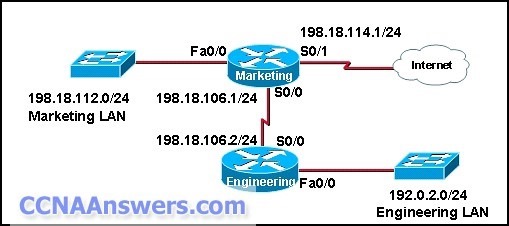
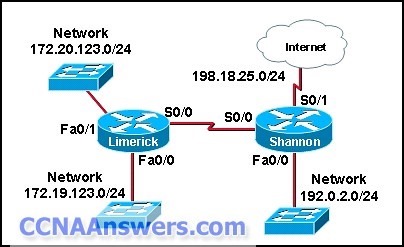

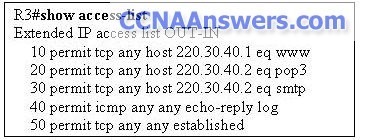
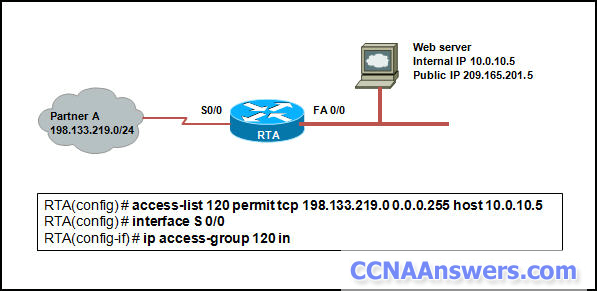
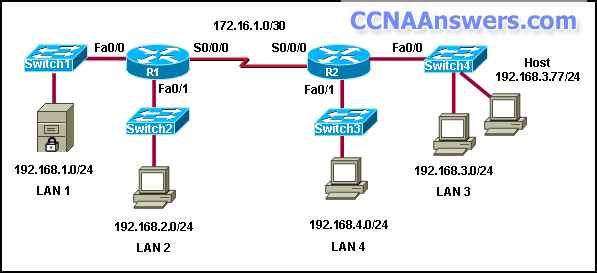


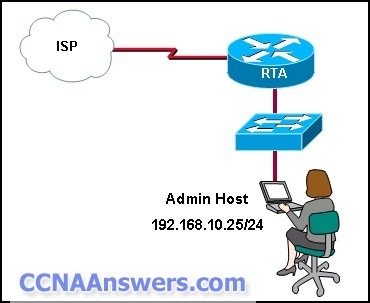
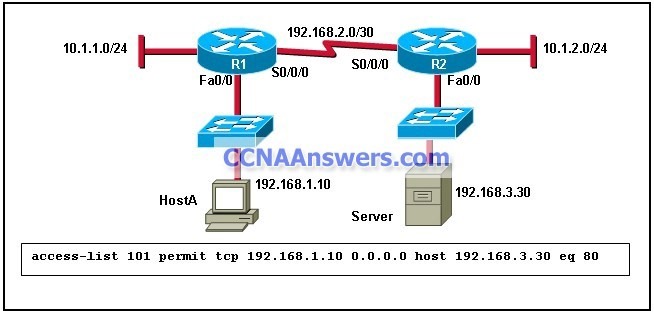
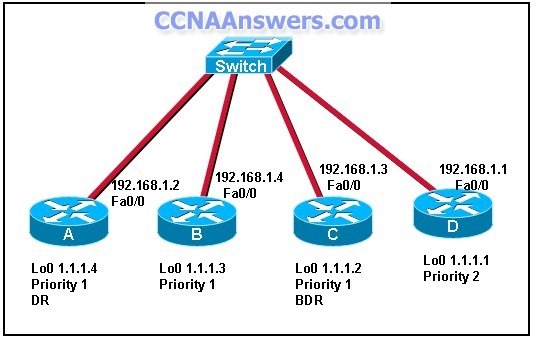

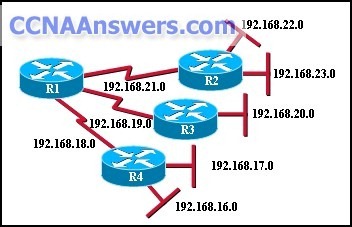
Leave a Reply